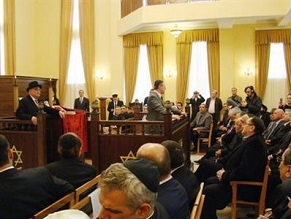|
World Jewish News

A new synagogue was opened in Baku in 2003 thanks to the generosity of donors of various faiths, including Azerbaijani Muslims.
|
‘Anti-Semitism is non-existent in Azerbaijan’
13.11.2013, Jews and Society ‘’Unlike many other countries in the world, there is no discrimination, no social hostility and no organized manifestation of anti-Semitism in Azerbaijan,’’ says Willy Fautré, Chairman of Human Rights Without Frontiers(HRWF), a Brussels-based NGO promoting human rights and religious tolerance at the European Parliament and in other EU institutions.
‘’Jews started living in Azerbaijan more than 2,000 years ago and for about 1400 years as a minority in a Muslim environment. Throughout this period, they have been fully part of society regardless of the regime under which they lived. Seven communities have been registered by the state since the country’s independence in 1991,’’ Fautré told a conference Tuesday in the European parliament on Azerbaijan’s response to the question: ‘’Is Islam incompatible with the rights of non-Muslim minorities and secularism.’’.
Fautré led a fact finding mission of his organization that visited last August a dozen non-Muslim religious communities of Azerbaijan, a country which is massively populated by Shi’a and Sunni Muslims (96%).
A secular country where people of different confessions – Islam, Christianity, Judaism and others – have lived together for centuries in peace and harmony and where Islamic fundamentalist ideas have had no success in the tolerant atmosphere of the country.
“Jews, Christians, Muslims enjoy full freedom of religion and the presence of Jews in Azerbaijan has never provoked hostile reactions,” reported the HRWF Director.
‘’However, one should attentively observe the attempts of extremists from the neighbouring countries, including Iran, to infiltrate the Azeri society,’’ he said.
‘’Religious leaders of Islam, Christianity and Judaism do not compete against each other when preaching to their faithful. All these elements have created a specific culture which cultivates tolerance towards all religions and inter-faith solidarity. Muslims, Christians and Jews participate in each other's religious festivals,’’ mentions Fautré in his report of the visit in Baku and other cities of Azerbaijan.
The history of the Jews in Azerbaijan dates back to the Antiquity. About 10,000 Jews live in the country today within three major communities: the Mountain Jews, European (Ashkenazi Jews) and Georgian Jews. They mainly reside in the cities of Baku, Sumgait, Guba, Oguz, Gochay and Krasnaya Sloboda, the only town in the country where Jews constitute the majority of the inhabitants.
A new synagogue was opened in Baku in 2003 thanks to the generosity of donors of various faiths, including Azerbaijani Muslims and in the same year a first Jewish school was granted a state teaching license.
During the conference, Moisey Bekker, a representative of the religious community of Georgian Jews in Azerbaijan, confirmed the traditionally strong ties between the Jewish community and the country. ‘’Even during the Soviet era, Jews have not suffered from discrimination but were even protected by the Azeri,’’ he said.
Bekker further gave the specific example of Krasnaya Sloboda, also called the “Red Town”, were approximately 4,000 Mountain Jews live.
“Azerbaijan’s successful model of religious tolerance is applicable for other parts of the world too”, said Elshad İskandarov, Azerbaijani Minister in charge of Religious Affairs.
As a historian, however, he regards certain elements of the “atmosphere of tolerance” as non-transferable as they have grown traditionally in the specific context of the country. The Minister outlined that the Azeri history has always been “inclusive rather than exclusive” which was mainly due to the country’s geographic situation, exposing it since ancient times to external powers.
“The lesson of history was to cooperate in order to survive”, he said.
According to the minister, the tolerance of Azeri society is therefore not created by the government but dates back to the country’s tradition.
He defined Azerbaijan’s approach to religious tolerance as “positive secularism”. This must be distinguished from the French model of laicism, he said, because, although religion and state are separated in Azerbaijan, the positive trends of each religious group are still encouraged.
by: Yossi Lempkowicz. Justyna Laskowski contributed to this news.
EJP
|
|
